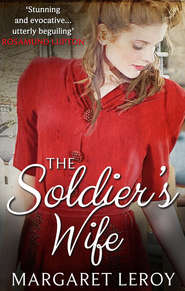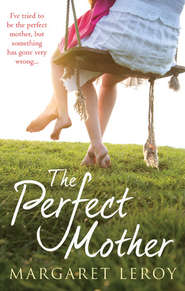По всем вопросам обращайтесь на: info@litportal.ru
(©) 2003-2024.
✖
The Drowning Girl
Автор
Год написания книги
2018
Настройки чтения
Размер шрифта
Высота строк
Поля
And she’s right: for the moment Sylvie seems quite poised and controlled, clasping her hands together neatly in her lap. Her lips are pursed with concentration; the expression is precisely Dominic’s.
The magician kneels beside her.
‘No worries, OK, sweetheart? I promise not to turn you into a tadpole or anything.’
She gives him a slight smile that says this is naive of him, that of course she knows how the world works.
He scribbles in the air with his wand, mutters something in Latin. A flourish of his cloak entirely covers her for an instant. When he flings back the silk with a slight air of triumph, a real live rabbit is sitting in Sylvie’s lap. The children applaud. Sylvie hugs the rabbit.
Fiona turns towards me.
‘That’s your little girl, isn’t it?’ she says. ‘That’s Sylvie?’
‘Yes,’ I tell her.
Sylvie is stroking the rabbit with cautious, gentle gestures. She seems oblivious of the other children. She looks entirely happy.
‘I’m not surprised he chose her,’ she says. ‘That white-blonde hair, and those eyes.’
‘She was sitting right at the front, I guess,’ I say.
‘She’s just so cute,’ says Fiona. ‘And I’m always fascinated by the way she calls you by your Christian name… Of course, in our family we’re rather more traditional.’
‘That didn’t come from me,’ I say.
But she isn’t really listening.
‘Was it something you felt very strongly about?’ she says.
Her crystal earrings send out spiky shards of light.
‘Not at all,’ I say. ‘It was Sylvie’s choice. It came from her. She never called me Mum.’
The woman’s eyes are on me, taking in my short denim skirt, my jacket patterned with sequins, my strappy scarlet shoes. She’s older than me, and so much more solid and certain. Her expression is opaque.
‘Just never said Mama? What, even when she was just beginning to talk?’
‘No. Never.’ I feel accused. I swallow down the urge to apologise.
‘Goodness.’ She has a troubled look. ‘So what about her dad? What does she call him?’
‘She doesn’t see him,’ I tell her. ‘I’m a single parent. It’s just us—just me and Sylvie.’
‘Oh, I’m so sorry,’ she says. As though embarrassed that she has called out this admission from me. ‘That must be quite a struggle for you,’ she goes on. ‘I honestly just don’t know how I’d cope without Dan.’
There’s a surge of noise from the living room, where the children are tidying, under the watchful eye of the magician. The rabbit is in a basket now.
‘He’s doing the games, as well,’ says Karen. ‘Isn’t that fabulous?’
Leo comes to refill his glass. He’s wearing a polo shirt that doesn’t really suit him: he’s one of those substantial men who look best in formal clothes. He greets us with the exaggerated bonhomie that men always seem to adopt on joining a group of mothers. He comes from Scotland and has a mellifluous Gaelic accent. He puts his arm round Karen, caressing her shoulder through the chiffony fabric of her frock. I can tell he likes the witch outfit. Much later, perhaps, when the party is over and the clearing up is all done, he will ask her to put it on again.
Michaela leans across the table towards me. She wants to talk about nurseries. Am I happy with Little Acorns, where Sylvie goes? She’s heard that Mrs Pace-Barden, who runs it, is really very dynamic. She has her doubts about nannies. Well, you never get to see what they’re actually up to, do you? She heard about this nanny who fed the kids on a different flavour of Angel Delight every lunchtime, because the mother said to be sure to give them plenty of fruit. I turn with relief from Fiona. In the living room, the magician is setting up a game of apple-bobbing. The girls make an orderly queue, though Josh and some of the other boys are racing around at the edges of the room.
The wine eases into my veins. I have my back to the living room now; I let my vigilance relax, enjoying this conversation. I love to talk about Sylvie’s nursery—it’s my one big luxury; I was thrilled when they gave her a place. The candles glimmer and tremble on the windowsill, and behind them, in Karen’s garden, darkness clots and thickens in the hollows under the hedge.
Out of nowhere, some instinct makes me turn. It’s Sylvie’s go at apple-bobbing; she’s kneeling by the bowl. I don’t see exactly what happens. A commotion, a scrabble of boys near the bowl; and then water everywhere—all over the stripped pine floor, and on Sylvie’s hair and her clothes. I see her face, but I can’t get there in time, can’t undo it. I’m too late, I’m always too late. She’s kneeling there, taut as a wire, the other children already backing away from her: tense, white, the held breath, then the scream.
The children part to let me through. I kneel beside her and hold her. Her body is rigid, she’s fighting against me; her screams are thin, high, edged with fear. When I put my arms around her, she pushes against my chest with her fists, as though I am her enemy. Everyone’s eyes are on us: the other children, fascinated, a little superior, the women, at once sympathetic and disapproving. I glimpse the magician’s look of startled concern as he gathers the other children together for the next game. I try to sweep her up in my arms, but she’s fighting me, I can’t do it. I half carry, half drag her into the hall. Karen comes after us, closes the living-room door.
‘Grace, I’m so sorry,’ she mouths at me through Sylvie’s screams. ‘I forgot Sylvie’s thing about water. It’s my fault, Grace, I should have told him… Look, don’t forget her party bag, there are pumpkin biscuits…’ She thrusts a coloured plastic bag in my direction, but I can’t take it, my hands are full with Sylvie. ‘Don’t worry, I’ll keep it for her. Hell, Grace…’
I kneel there clasping Sylvie on the pale expensive carpet in Karen’s immaculate hall. Sometimes when Sylvie works herself up like this she’s sick. I know I have to get her out.
‘It was a lovely party,’ I tell her. ‘I’ll ring you.’ Sylvie’s screams drown out my words.
Karen holds open the door for us.
I manoeuvre Sylvie down the path and along the darkening pavement. Her crying is shockingly loud, ripping apart the stillness of the street.
When I get to the car I hold her tight against me and scrabble in my bag for the keys and manage to open the door. I sit in the driving seat, holding her close on my lap. We sit there for a long time. Gradually she quietens, the tension leaving her; she sinks into me, crying more gently. Her face and the front of her dress are wet, from the water that splashed on her, and her tears; her eyelashes are clumped together, as though with cheap mascara.
I dry her face and smooth her hair.
‘Shall we go home now?’
She nods. She climbs into the back and fastens her belt.
My hands on the steering wheel are shaking, and I’m cautious at junctions, I know that I’m not driving well. My car smells as always of pollen, from the flowers I deliver; I flick a broken frond of fern from the dashboard onto the floor. I glance at Sylvie in the rear-view mirror. Her face is absolutely white, like someone coming round from shock. There’s a dull weight of dread in my stomach, the feeling I always try to overlook or push away: the sense I have that there’s something about Sylvie that is utterly beyond me. There’s too much sadness in her crying, too much fear.
* * *
My flat is in Highfields, in a street of Victorian terraces. Long ago, this was an imposing address, now it’s the red-light district. In the street near my door, there are smells of petrol and urine, and the thick unwholesome perfume of rotting melons from the market. The sky is the colour of ink, and absolutely cloudless; later, once it’s fully dark, there will be lots of stars. A couple of prostitutes are huddled on the corner, next to Somerfield, bare-legged and quietly talking, a blue vague haze of cigarette smoke around them.
There’s a nervousness I feel always, coming back to our home. The flat is on the ground floor, with an alleyway beside it, and I worry about intruders—about the rootless, drifting people I often see in the street. Sometimes I think I should have chosen somewhere different, more rational. And it’s draughty, high-ceilinged, hard to heat, with a temperamental boiler in the bathroom. My elderly landlady, who smells of eucalyptus and wears a moth-eaten leopardskin coat, explained about the boiler when we moved here, but I’ve never got the hang of it. And it all has a rather empty feel—the flimsy wicker furniture that was all I could afford is really too insubstantial for these high-ceilinged rooms. But it has French windows and a scrap of garden—a patchy lawn, a wall of yellow London brick, a mulberry tree that’s trained against the wall. To be honest, I probably chose it because of the mulberry. It was fruiting when we first came here, and, urged on by the landlady, I picked a mulberry each for Sylvie and for me. Sylvie held her hand out; I put the mulberry onto her palm.
‘Hold it lightly,’ I told her. ‘Careful you don’t crush it.’
Her eyes were round and very bright. She kept her hand flat, lowering her mouth to her hand—with a kind of reverence, almost, as though the fruit were some precious thing. I thought she might not like it—that the taste would be too complex, too subtle, the winey sharp-sweetness of it—but she loved it, ate it slowly, ceremoniously. Her hand and her mouth were stained with vivid juice.
I open up, turn the light on. Everything is as it should be. My living room greets me, orderly and tranquil, the calico curtains, the apples in a bowl. Some sunflowers I brought back from the shop—not fit to sell, but still with a day or two’s life in them—are glowing on my table.
Sylvie is exhausted now. When I sit on the sofa and pull her down beside me, her body is heavy, her head droops into my chest. I breathe in the scent of her hair. As I watch, her eyelids flicker wildly; between one breath and the next, she sinks deeply into sleep. I lay her down on the sofa, carefully, scarcely breathing, as though she could easily break. I cover her with the duvet from her bedroom, tuck in Big Ted beside her. When she wakes she’ll be fine, as though none of this had happened.
I sit there for a while, relishing the silence and the sound of her peaceful breath. I think of the women at the party, sitting around Karen’s table, their orderly lives and platinum wedding rings and confident opinions. I wonder what they have said about me, about Sylvie. I imagine their conversations. ‘Poor Grace, what a pain for her…’ ‘Of course kids have tantrums, but not like that, not when she’s nearly four…’ ‘It’s so important to let them know where you stand. You have to be consistent…’ ‘Well, of course, Grace is on her own. That can’t help when it comes to discipline…’
And Karen—what will she be thinking? Will she be joining in? Solicitous, concerned, perhaps a little disapproving? Karen matters so much to me. I’m grateful for her friendship, yet always uneasy because it feels so unequal. I could never ask her and Lennie to visit us here; I know just what she’d think about the syringes in the street. We always meet at her place, where there’s a family room that’s full of books and toys and sunlight, and the whole wide garden to play in with its tree house and velvet lawns.
I met Karen on the maternity ward, after giving birth to Sylvie. It was a strange time. You’re opened up, your body breached, all your defences down. I scarcely slept at all, the ward was so noisy at night. Instead I’d lie and stare at Sylvie through the transparent walls of her cot, just stare and stare; I couldn’t believe that such a perfect creature existed. Or in the day I’d hold her for hours, feeding her or just rocking her in my arms. Thinking, She is mine. My daughter. And when she startled when a door banged, and I felt the fear go through her, I thought, She only has me. She only has meto keep her safe. I knew that I would do anything to protect her, that I’d die for her if I had to; I wouldn’t have to choose, I’d just do it. There’s a kind of exultant freedom in that knowledge—to love someone more than you love yourself. Not by any effort of will, but just because you do.









